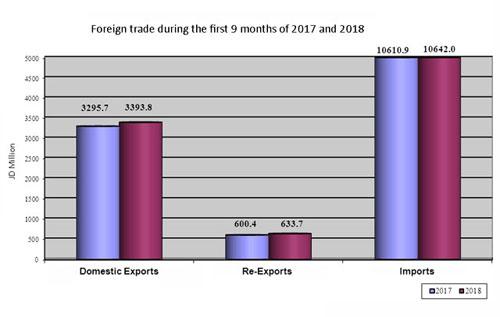You are here
Trade balance deficit drops by 1.5% in first nine months of 2018
By Ahmed Bani Mustafa - Nov 29,2018 - Last updated at Nov 29,2018

AMMAN — To mitigate the rising costs of importing oil, Jordan should look to boost renewable energy contributions to the national energy mix, as a more sustainable, cost-effective alternative, pundits said on Wednesday.
Meanwhile, a Department of Statistics (DoS) report on the first nine months of 2018 shows oil import costs have increased by 41 per cent as compared with the same period last year.
Overall, national imports grew by 0.3 per cent to a total of JD10.6 billion, as exports hiked by 3.4 per cent to JD4 billion, according to the DoS report.
Re-exported goods also grew by JD633.7 million by approximately 5.5 per cent compared with the same period of 2017.
Jordan’s imports of vehicles and spare parts dropped by 26 per cent, according to the report.
Imports from Saudi Arabia increased by 39 per cent during the first nine months of the year, while exports to the neighbouring kingdom decreased by 16 per cent.
Textile and garments topped Jordan’s exports with a 13.2 per cent growth rate, followed by potash at 13.8 per cent and fertilisers at 24 per cent, the DoS report said.
Exports to countries of the free trade agreement with North America grew by 11 per cent to a total of JD972 million, while exports to countries of the Arab free trade zone dropped by 4.4 per cent to JD1.4 billion.
Jordan’s exports to the US increased by 10.7 per cent, whereas exports to EU countries grew by 18 per cent in the first nine months of 2018.
The hike in international crude oil prices has driven oil import costs up almost by 50 per cent, economist Zayyan Zawane told The Jordan Times.
Domestically, the drop in purchasing power has driven demand on imported vehicles down, he said, citing a previous report on Jordanian household incomes.
According to Zawane, Jordanian households expend nearly 40 per cent of their income on water bills, electricity and transportation.
To mitigate and reduce power costs, the government should turn towards alternative energy sources that are more cost-effective and sustainable, Wajdi Makhamreh said.
"Importing crude oil drains hard currency and exhausts the national treasury, which necessitates increasing the contribution of renewable energy to the national energy mix," he said.
All relevant legislation and regulations should be redirected to facilitate and accelerate the development of the renewable energy sector, he added.
On the trade balance deficit, Al Ghad daily economy columnist Yousef Damra said that foreign trade is highly susceptible to external factors such as border closures and regional turmoil.
"Jordan currently imports around 95 per cent of its needs of oil. The costs of importing oil are hiking. Fluctuation prices of crude oil do not help Jordan’s sensitive economic situation. Renewable energy is integral to addressing the skyrocketing oil bill in the face of global and regional challenges," Damra said.
The government, according to Damra, is required to revisit its trade ties with some of its trade partners to realise better, more mutually beneficial trade terms for more sustainable and balanced partnerships.
Related Articles
AMMAN — The volume of national exports in 2018 grew by 3.6 per cent compared with 2017, pushed by the increase in clothes, potash and fertil
AMMAN — Jordan’s import of crude phosphate dropped by 20.8 per cent during the last four months, while pharmaceuticals dropped by
Jordan's exports of fruits and vegetables are picking up despite instability in neighbouring Iraq and Syria which once were key importers of the Kingdom's agriculture produce.















